From October 28 to 31, 2017, the “Tsinghua Students Dialogue with Board Members” was held as part of the series of activities of Tsinghua SEM 2017 Advisory Board Meeting. 16 Board members entered 17 Tsinghua SEM classrooms to interact with students in an intimate setting.
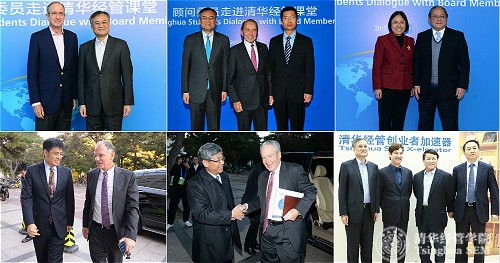
Advisory Board Members arrived at Tsinghua SEM
The 16 Board members participating in the dialogue sessions were: Mark Zuckerberg, Founder and CEO, Facebook, John L. Thornton, Chairman, Barrick Gold Corporation, Chairman, Board of Trustees, Brookings Institution, Brian L. Roberts, Chairman and CEO, Comcast NBCUniversal, Risto K. Siilasmaa, Chairman, Nokia Corporation, Chairman and Founder, F-Secure Corporation, Marjorie Yang, Chairman, Esquel Group, Stephen A. Schwarzman, Chairman, CEO and Co-Founder, Blackstone, Victor K. Fung, Group Chairman, Fung Group, Honorary Chairman, Li & Fung Limited, Christopher B. Galvin, Chairman, CEO and Co-Founder, Harrison Street Capital LLC, Former Chairman and CEO, Motorola Inc., Maurice R. Greenberg, Chairman, Starr Companies, Former Chairman and CEO, AIG, Carlos Ghosn, Chairman and CEO, Renault-Nissan-Mitsubishi, Eric S. Maskin, Adams University Professor, Harvard University, 2007 Nobel Laureate in Economics, Satya Nadella, CEO, Microsoft, QIU Yong, President, Tsinghua University, Geoffrey Garrett, Dean, The Wharton School of the University of Pennsylvania, Reliance Professor of Management and Private Enterprise, Professor of Political Science, Andrónico Luksic, Chairman, Luksic Group, and Jim Breyer, Founder and CEO, Breyer Capital.
In the event on October 28, 2017, three start-up teams, DeepMusic, Luckey and AiHrt, introduced their projects. Zuckerberg and Dean QIAN listened to the team pitches, tried out their products, gave remarks about the projects’ technology, progress and competence. After the presentation of three entrepreneurial teams, Zuckerberg and Dean QIAN had a dialogue. In the dialogue, Dean QIAN discussed the current innovation and entrepreneurship environment, the combination of artificial intelligence and personalized education and other hot topics with Zuckerberg. Zuckerberg expressed his belief that truly successful startups are not meant to start a large enterprise, but to solve a significant problem. When the external environment is complex, entrepreneurs should pay more attention to technical issues that they are interested in. In the future, the combination of artificial intelligence and personalized education can provide individuals with more educational services in line with their own interest, style and pace. Finally, Zuckerberg shared his experience as the helm of Facebook and a technology innovator, and wished students to always hold the initial passion of entrepreneurship, and use the passion to change around, and change the world.
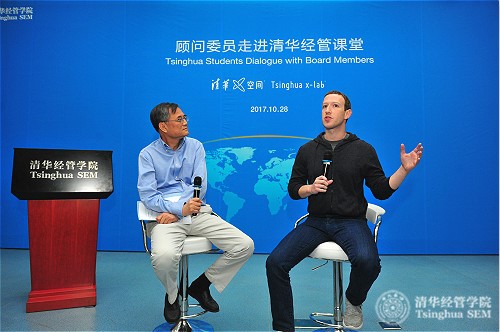
Dean QIAN Yingyi dialogued with Mark Zuckerberg, Founder and CEO, Facebook
Given the topic of “the contemporary relationship between China and the U.S.”, Thornton delivered an inspiring and interactive speech. Thornton considered the rise of China as his most interested but least learned worldwide topic back to when he decided to leave the Goldman Sachs and started his seminars in Tsinghua SEM. To get immersed in the Chinese environment and gain a better-rounded understanding, he interviewed around 500 Chinese students one on one, and each for an hour, to learn about authentic Chinese students’ childhood experience. Meanwhile, Thornton still acknowledged that, as an outsider, getting fully engaged in a foreign culture can be far more difficult than imagine, and the best solution is to build up a solid relationship with insiders based on deep trust, which is one of his lifetime careers and beliefs. As for university education, Thornton suggested students challenging themselves and richening own life experiences, being trustworthy to get fully involved in multi-culture communication environment, and building up a mindset in terms of understanding and respect to distinguished cultures.
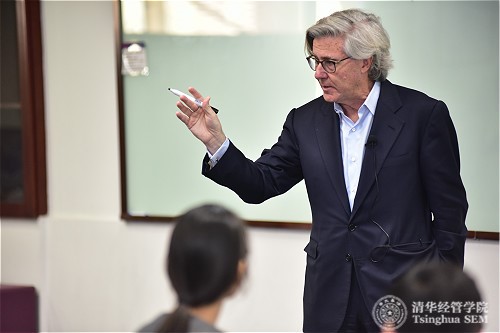
John L. Thornton, Chairman, Barrick Gold Corporation, Chairman, Board of Trustees, Brookings Institution
Roberts shared his insights on the topic of “Entrepreneurship: persistent innovations and revolutions”. He started by introducing Comcast and charting its development against breakthroughs in technology. Roberts stressed the importance of an entrepreneurial culture and maintaining the right mindset. He also emphasized an owner not tenant mentality. At Comcast, employees are incentivized to act like owners and not back into a risk-averse bureaucratic mindset. Indeed, this forward looking mentality is increasingly important as personalization, the shared economy, user-centricity, and multi-tasking continue to redefine media and entertainment.
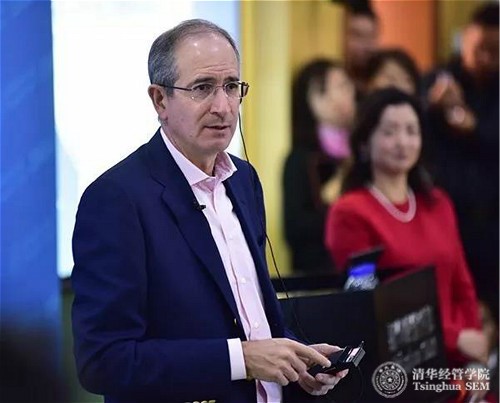
Brian L. Roberts, Chairman and CEO, Comcast NBCUniversal
Siilasmaa has brought a fruitful speech under the topic of “Machine Learning Revolutionizing Value Creation”. He started from his personal experiences in studying machine learning, explaining what’s truly behind machine learning for us using various vivid examples. Siilasmaa pointed out that training neutral networks is time consuming unless using matured networks. Afterwards, Siilasmaa talked about the strategic meaning of machine learning. He believed machine learning’s huge capability of helping accomplish missions that humans are not able to, even if there’s still a long road to the general use of artificial intelligence. Talking about the drawbacks of machine learning, Siilasmaa compared machine learning with the process of children education, where incorrect inputs can lead to wrong outputs that we would usually ignore. In the end, Siilasmaa shared the 5 steps for an organization to complete to embrace the AI era, and he reckoned that corporate strategy tends to have lower predictability and higher complexity at the new stage.
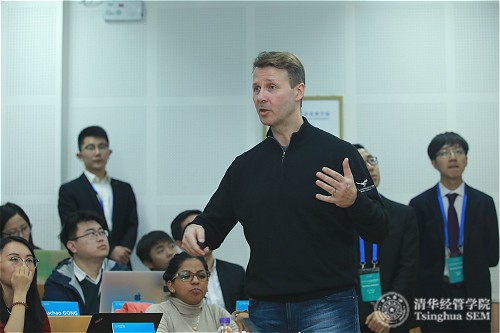
Risto K. Siilasmaa, Chairman, Nokia Corporation, Chairman and Founder, F-Secure Corporation
Marjorie Yang delivered a speech on the topic of “I don’t make shirts, I make a difference”. She believes what university do is to teach students to get a way to think critically instead of just teaching knowledge no matter what kind of major they are in. Then she introduced what they are doing in Esquel and what kind of changes they would like to bring to both the company and the society. Esquel Group uses green materials and exploring new eco-friendly with universities and the country. They consider building a team is much more important than chasing production number. She told students not to follow certain myths and this is the foundation for a leader. About technology implementing in textile industry, she viewed it from a different perspective. She thinks only when workers are comfortable to master the skills can they really go with the company. She also mentioned that a good company is the best way to help the government to stabilize the community. She emphasized on the company’s society role, they should not just be the one who chase for production, but they should also be able to help the workers to seek a better life.
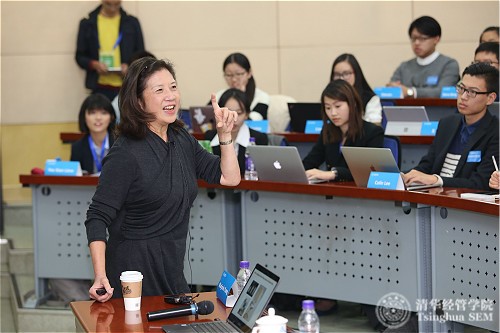
Marjorie Yang, Chairman, Esquel Group
Schwarzman shared his knowledge and personal experiences on “How to Personally be Successful in the Global Economy”. From a deeply personal story of his upbringing, Schwarzman illustrated to the students in attendance the fundamentals of happiness and how it translates into both financial and personal success. He emphasized the importance of pursuing to one’s talent and dream. Being passionate about one’s work is crucial to success in both career and entrepreneurship, and to fulfill long term visions, no compromise should be made to that passion. He used his founding of Blackstone as an example to depict the combination of hard work and vision that entrepreneurs must possess in achieving their goals. Fortunately, he pointed out, although entrepreneurship is hard, for Tsinghua students the success rate should be much higher. This is because Tsinghua students are future leaders of a nation that is rapidly changing, where the government and industries are constantly working in bettering China.
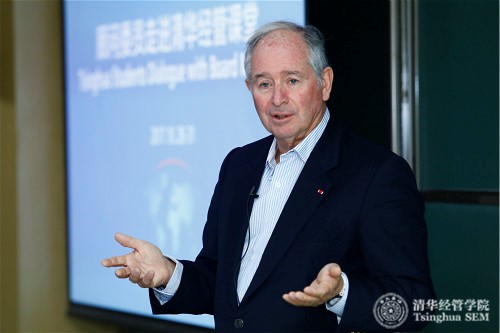
Stephen A. Schwarzman, Chairman, CEO and Co-Founder, Blackstone
Fung shared his insights on "Developments in Global Supply Chain Management". He reviewed the major globalization events during the past 30 years, and narrated the differences in the Hong Kong-China business eco-system before and after the Chinese Economic Reform. Using Hong Kong as an example, Fung highlighted the role of the global supply chain in lowering product costs during the past few decades, and more importantly, how it allowed many developing countries to be a part of globalization, thereby improving billions of lives in the process. Later, Fung described "the shift of globalization from production to consumption". Using Li & Fung as an example, Fung predicted that there would be a shift of future consumption from the OECD countries to China and other developing countries. During the Q&A session, Fung answered questions about Hong Kong's future role in globalization, trends in the global retail supply chain, the impact of 3D-printing and Li & Fung's current strategy.
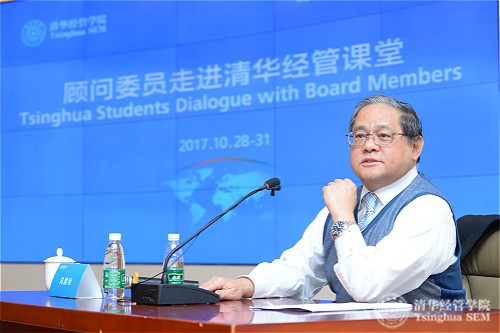
Victor K. Fung, Group Chairman, Fung Group, Honorary Chairman, Li & Fung Limited
Galvin delivered a speech on the topic of “Innovation and Trust”. He stressed the importance of trust in the business world and shared his family’s philosophy that ability to manage complexity is a huge barrier of entry to the competitors. Galvin defined leadership as “go elsewhere” – do things that others don’t. Galvin introduced “business culture anthropology” and stated its importance in the current global economy. He elaborated that a company studies business culture like an anthropologist does – know what people are thinking and what are important to them – would have a very significant advantage over competitors in the same industry. Galvin defined innovation as “introducing the new”. To find a new idea, he stated, one should approach the problem from a new angle. At Harrison Street Capital, he applied Six Sigma to test every process in the real estate business.
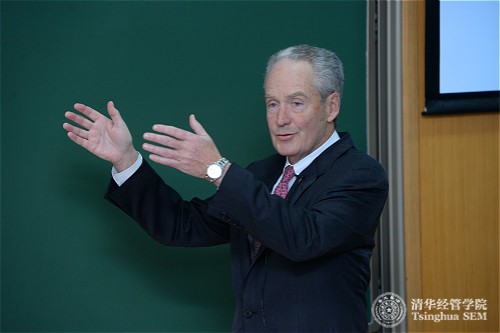
Christopher B. Galvin, Chairman, CEO and Co-Founder, Harrison Street Capital LLC, Former Chairman and CEO, Motorola Inc.
Greenberg gave a speech about his legendary experience and views on insurance industry. He began with introducing the history and development of AIG. As one of the most influential leaders of US insurance industry, he spent 37 years changing American International Group from a small and medium-sized company into the largest insurance company in the world. His decisive and precise character, which was influenced by his two military experiences, has shaped strong leadership to run the company. He also gave Tsinghua students many profound insights into insurance industry at the dialogue and stressed the fact that China is leading the new world trading system. When it came to enterprises globalization, Greenberg proposed that if enterprises want to internationalization, specific regulations should be taken into consideration. As the development of industries is always accompanied with change, it is of great importance to understand and learn from it. An impressive part of the speech was technology especially the importance of artificial intelligence, on which Greenberg gave comments that “AI will influence all industries.”
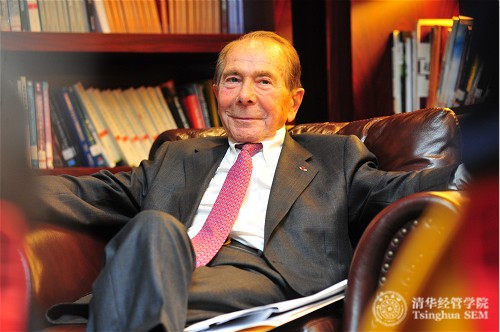
Maurice R. Greenberg, Chairman, Starr Companies, Former Chairman and CEO, AIG
Ghosn shared his insights on the topic of “Global leadership and impact of new technologies on the automotive”. Being asked to share the recipe for success in alliances and reorganization with China’s automobile industry, Ghosn said as Chinese automobile industry is becoming more ambitious and competitive, and going into the world, keeping autonomy of the brands and at the same time having strong discipline to avoid double costing and duplication can be a way. He underlined in a global world, forming an alliance is the only way to combine the agility of multiple companies and the scale which benefits each company. Ghosn mentioned his company is facing two major challenges -- emission and artificial intelligence (AI), which can also be regarded as opportunities. The effect of climate change is a serious issue that is going to change a lot of things including the way how we do business for years to come. AI is making things impossible in the past become possible today. In addition, the AI technology also has impact on social phenomenon like safety and security. At the end, Ghosn also gave a career advice based on his own experience to the students that every time you have the chance to move to a troubled company, take it, because it is where you have opportunities to make a difference, to exercise leadership, to make a contribution and to make a change in a difficult environment.
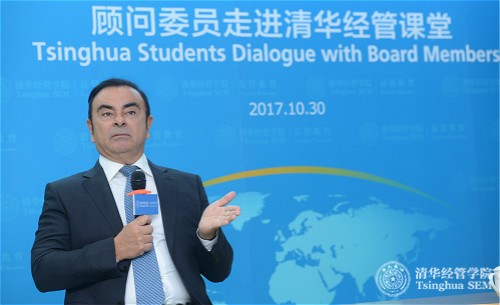
Carlos Ghosn, Chairman and CEO, Renault-Nissan-Mitsubishi
Professor Maskin shared his person experience and insights on academic research. He emphasized the importance of studies of economics and encouraged young scholars from Tsinghua SEM to be open minded and innovative. He also answered questions on BitCoin, choosing research topic and methods, time management, etc.
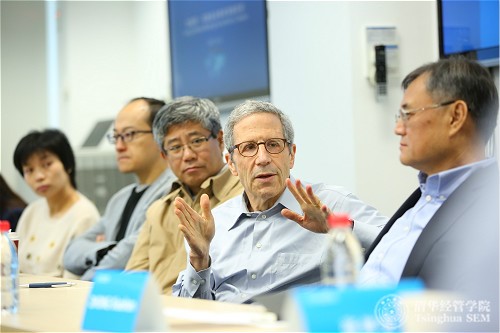
Eric S. Maskin, Adams University Professor, Harvard University, 2007 Nobel Laureate in Economics
Nadella shared his sights on the topic of “The transformation and innovation of Microsoft”. He believes that Microsoft can be part of the Chinese model of growth as Microsoft’s goal is to contribute to local opportunity, local innovation, and local partners. With regard to artificial intelligence (AI), Nadella said that we must first make sure that artificial intelligence is designed to empower people, develop human potential and promote economic development. In real life, artificial intelligence can interact more with our economic and social life, helping us to find the proper jobs instead of losing jobs. The development of artificial intelligence is not to defeat humankind, but to push us up to a new stage. Nadella has also given his unique insights on career and decision-making. He emphasized that one should follow his or her own heart when making a choice. Among all choices, the sources of strength come from the inner needs, and it’s the inner needs that determine the external world.
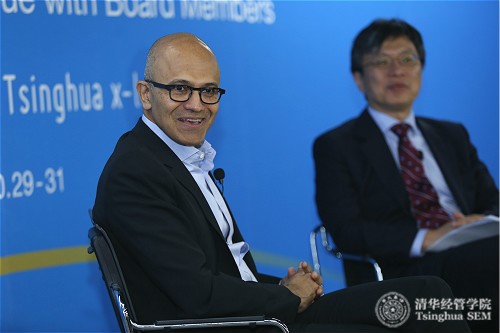
Satya Nadella, CEO, Microsoft
President QIU Yong delivered a speech on “The mission of universities in the 21st century”. At the beginning, President QIU said the 21st Century was characterized with innovation and globalization. The mission of universities is to promote social innovation by delivering innovation education and conducting innovation activities, thus, universities are in a pivot position in global innovation network, and should be responsible for talent cultivation, scientific research, social service, cultural inheritance, and international cooperation. President QIU then talked about the challenges faced by universities, enterprises and the whole society. He compared the teaching paradigms of universities in America and China, and concluded that American tended to be more “education-oriented” and Chinese tended to be more “indoctrination-oriented”. After that, President QIU talked about the on-going comprehensive reform endeavor of Tsinghua University. In particular, he elaborated the four missions and aspirations of Tsinghua. He posited that Tsinghua University should build high level education system, talents supporting system and be the leaders in cooperative innovation.
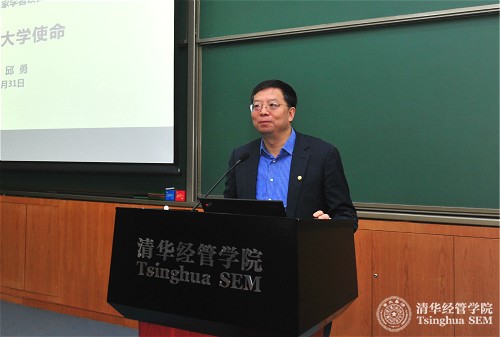
QIU Yong, President, Tsinghua University
Geoffrey Garrett had a morning tea session with young scholars from Tsinghua SEM and shared his insights on the topic of “Balancing research and teaching”. He encouraged Chinese young scholars to “speak China to the world” and sharing their research and findings on China’s economic development.
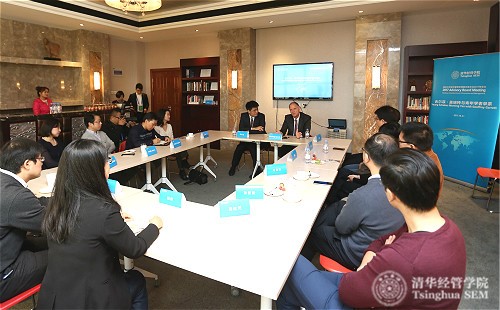
Geoffrey Garrett, Dean, The Wharton School of the University of Pennsylvania, Reliance Professor of Management and Private Enterprise, Professor of Political Science, had a morning tea with young scholars from Tsinghua SEM
Garett shared his thoughts on the topic of “China-US relationship: a win-win economic relationship”. He shared his experiences in China including discovering fast paced growing cities. He emphasized the importance of China by describing it as “the global economy engine”. The Belt & Road Initiative, China’s Marshall Plan are real-life examples of the investments made around the world. He summarized that in the past decade, through the low cost and innovative markets, China represents an opportunity for the global economy and more importantly to America. The relationship between the two countries should sustain for the sake of both nations.
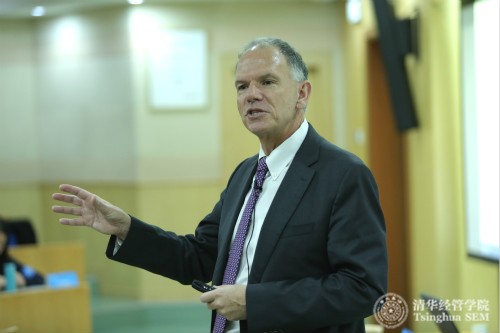
Geoffrey Garrett, Dean, The Wharton School of the University of Pennsylvania, Reliance Professor of Management and Private Enterprise, Professor of Political Science
Luksic delivered a speech on “Family business and entrepreneurship”. Recalling his experience of conquering the Mount Everest in May 2004, Luksic said mountain climbing, as a difficult and complicated task, has taught him teamwork is a very fundamental thing in a person’s life. Just like climbing the mountain, Luksic, as a world famous entrepreneur, has overcome many barriers and achieved many business successes in his career. One of his most unforgettable experiences was successfully acquiring a stake of 10 percent from Chile’s largest beer company-CCU, which was on the verge of bankruptcy during South American’s debt crisis in the 1980s, at a low cost and without any helps from financial institutions like Morgan Stanly. Luksic said with strong desire and willing to work hard, things looking impossible can still be achieved. In Luksic’s opinion, for family business successors who want to make a change, even if they have got degrees at the best universities like Tsinghua University and prepared themselves with the tools the universities provide them, they should still respect age and respect family members. “Develop your soft skills and always follow your dreams”, Luksic suggested.
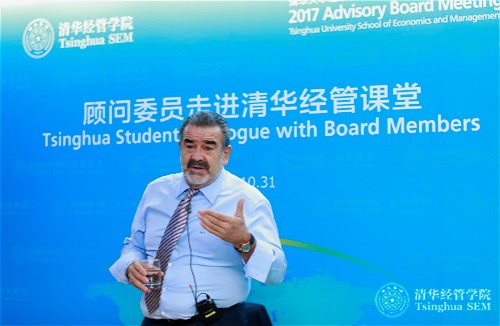
Andrónico Luksic, Chairman, Luksic Group
Breyer had a dialogue with Hugo Shong, Global Chairman of IDG Capital. Breyer emphasized the fact that venture capital is more than just business – it is an opportunity to build up relationships between regions and different nations. With China and the US constituting the most important bilateral relationship in the world, venture capitalists have the opportunity to bridge the culture gap and building lasting relationships. Breyer said that he is always looking for the next Facebook. The next decade includes tremendous opportunities in areas such as health services and mobile communications as artificial intelligence and machine learning start to redefine the field. Hugo Shong described the creation of IDG Capital with funds provided by Jim Breyer’s father and how close cooperation created the first successful venture capital firm in China. Opportunities in the Chinese market include the often overlooked B2B field and film entertainment, where the market will soon eclipse the US in size. However, Shong also emphasized the fact that venture capital in China has few good deals and too much capital. This has resulted in founders looking to cash in and leave the industry, while venture capital focuses on the pre-IPO process.
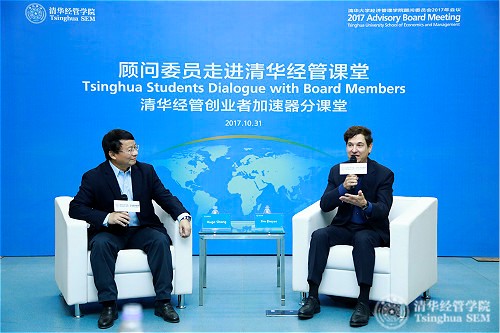
Jim Breyer, Founder and CEO, Breyer Capital, dialogued with Hugo Shong, Global Chairman of IDG Capital
The 2017 Tsinghua Students Dialogue with Board Members has come to encompass students from a larger variety of backgrounds. Apart from Tsinghua SEM’s undergraduates, doctoral, Master’s, MBA, EMBA and Executive Education students, students of Tsinghua x-lab and entrepreneurs of Tsinghua SEM X-elerator, and students from Tsinghua’s other schools and departments also participated in the dialogues.
 Latest News
Latest News